- Date2023-04-07 15:43
- View7,550
KEI and British Embassy Seoul Hosted the International Conference on Economic Value of Biodiversity
On March 30th, the Korea Environment Institute (KEI) hosted the International Conference on Economic Value of Biodiversity at the Four Seasons Hotel in Seoul. The conference was co-hosted by the British Embassy in Seoul and co-organized by the Korea Sustainability Investing Forum (KoSIF) and the World Wide Fund for Nature (WWF-Korea). The first session of the conference, which included four presentations, was chaired by Dr. Jong Ryul Kim, Director General at the Nature Conservation Bureau of the Ministry of Environment. The second session included a discussion among four participants, presided over by Dr. Who-Seung Lee, a Senior Research Fellow of the Division for Land Policy Assessment at KEI.
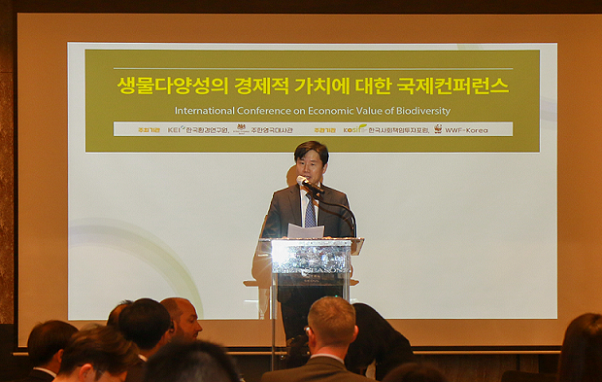
KEI President Chang Hoon Lee, delivering opening remarks
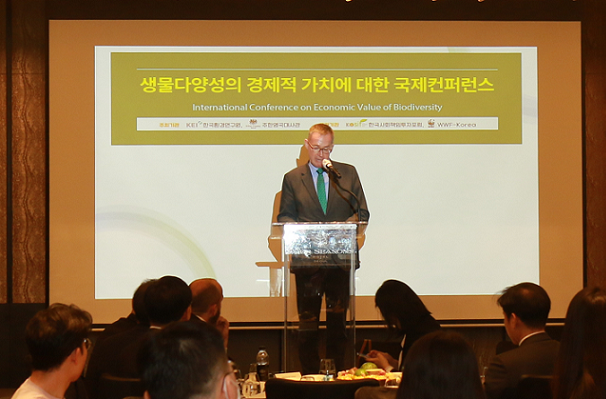
British Ambassador Colin Crooks, delivering opening remarks
The keynote speaker of the event was Dr. Jong Soo Yoon, Chair of the IUCN Korea National Committee, who emphasized the importance of biodiversity in his speech. According to the World Economic Forum (WEF), half of global GDP is dependent on nature and its services, which Dr. Yoon highlighted.
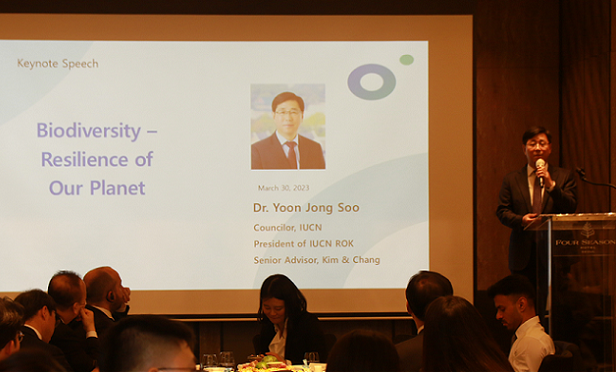
Dr.Jong Soo Yoon, IUCN Korea National Committee Chair
Jonathan Woodland, Head of Climate Diplomacy at the British Embassy in Seoul, emphasized the relationship between climate change and the degradation of tropical forests, which can lead to reduced rainfall and deforestation. He used the example of Brazil to illustrate the potential fatal consequences of biodiversity loss on the country’s economy.
Dr. Youngsoo Lee, a Chief Research Fellow at KEI, gave a presentation on South Korea’s climate change impact assessment (CCIA). First, Dr. Lee introduced Korea’s Environmental Impact Assessment (EIA) system and emphasized that the CCIA was introduced in accordance with new legislation. Additionally, he explained the impact assessment methodology used in the areas of greenhouse gas reduction and climate change adaptation, and presented various ideas on how to effectively operate the relevant systems.
Hyunjung Kim, a Senior Researcher at KoSIF, stated that there are increasing demands for natural resource conservation, including biodiversity, to be integrated into climate change response due to the close relationship between the two. Dr. Kim also pointed out that while Korean companies are giving considerable attention to biodiversity conservation, their actions still have room for improvement.
Benjamin Singer, a Senior Specialist at the Green Climate Fund (GCF), delivered the presentation on the investment status of the institution in biodiversity conservation. According to him, the institution has invested 5.36 billion dollars in biodiversity conservation, which accounts for approximately 47% of the total grants of 11.3 billion dollars that the institution received. In addition, he explained the various biodiversity conservation projects carried out worldwide by the GCF.
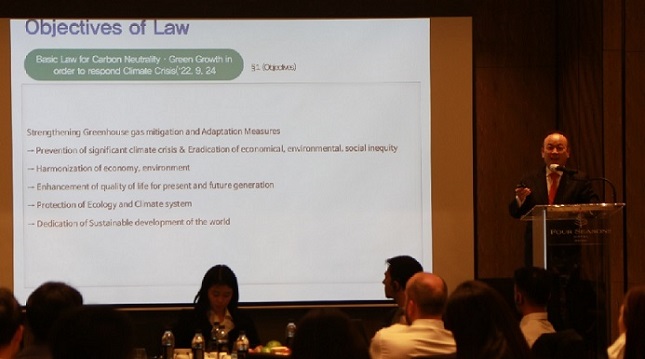
Dr. Youngsoo Lee, KEI Chief Research Fellow
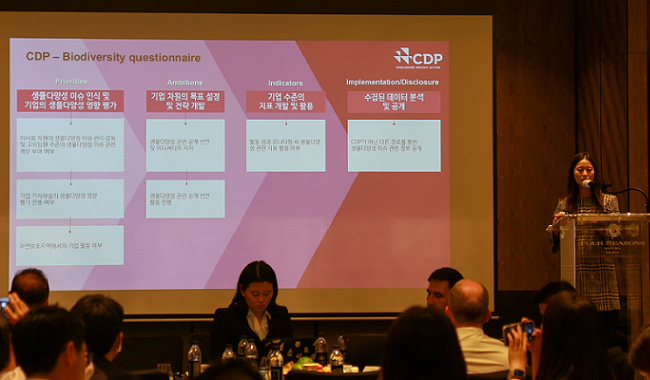
Hyunjung Kim, KoSIF Senior Researcher
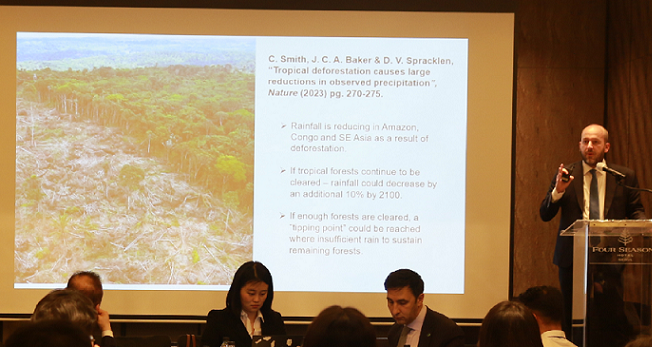
Benjamin Singer, GCF Senior Specialist
The discussion following the presentations included participation from Yoonjin Cho, a Senior Officer of the Climate and Energy Programme at WWF-Korea, Dr. Chan-Ho Park, a Senior Researcher at the National Institute of Biological Resources, Dr. Seong-won Park, a Research Fellow at the National Assembly Futures Institute, and Hae Jun Yang, a Senior Manager at the Woori Financial Group.
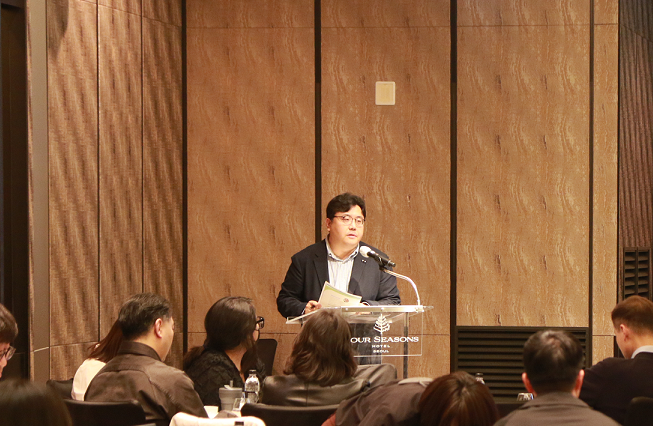
Dr. Who-Seung Lee, KEI Senior Research Fellow, presiding over the discussion session
During the discussion, Yoonjin Cho stated that wildlife populations in Latin America and the Caribbean regions have experienced an average decline of 94%, the sharpest decrease on a global scale. She emphasized that this is a clear example of the crisis facing our natural ecosystems, as the Amazon forest, which has high biodiversity, is located in these areas.
The main factors contributing to the decline in wildlife populations globally are habitat degradation, overuse of natural resources, introduction of alien species, environmental pollution, and climate change. Yoonjin Cho emphasized the importance of keeping the global temperature rise to below 2℃, stating that while it may be premature to determine climate change as the sole cause of biodiversity loss and ecosystem degradation, there is a high probability of this happening without successful efforts to mitigate its effects. Climate change is causing an increase in heat waves, wildfires, and drought events, which accelerates carbon emissions as dead plants decompose or burn. As a result, it is crucial to address climate change mitigation and biodiversity conservation simultaneously.
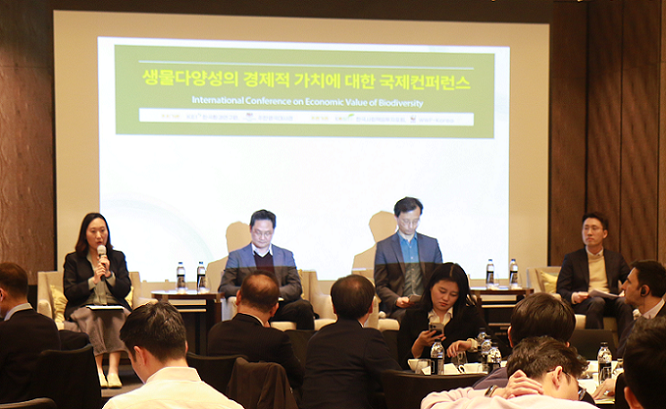
Discussion Session
Dr. Chan-Ho Park, a Senior Researcher at the National Institute of Biological Resources, emphasized that biodiversity facilitates the growth of companies and the financial sector. Biodiversity provides resources that serve as the basis for its business when a company enters society, which highlights the need to approach biodiversity conservation from an economic perspective as well. To promote the “wise” utilization of biological resources, Dr. Park emphasized the importance of expanding protected areas and strengthening their protection, promoting education on biodiversity conservation to increase awareness, monitoring and assessing the status of biological resources, and developing relevant policies.
Dr. Park stressed that it is now time to seek effective ways to use Nature-based Solutions (NBS) to conserve biodiversity while also maintaining economic activities. He also highlighted the need for international cooperation, as biodiversity loss is becoming increasingly “transboundary.”
Hae Jun Yang, Senior Manager at the Woori Financial Group, also emphasized that the ‘nature crisis’ inevitably leads to a ‘financial crisis’ of enterprises, not only for the food industry that is intrinsically dependent on various elements of nature, but also for financial institutions. Yang explained that when business loans or investments are made without considering ecosystems, companies dependent on natural resources may suffer cumulative damage, such as a fall in property value, which weakens the solvency of institutions.
“One of the major drives for social and economic transition, climate change response, and biodiversity conservation is financial capital. The general consensus has already been formed regarding the importance of the role of financial institutions,” said Yang. He suggested the future direction for the financial sector and enterprises in three areas: risk management, innovation and cooperation, and competitiveness.
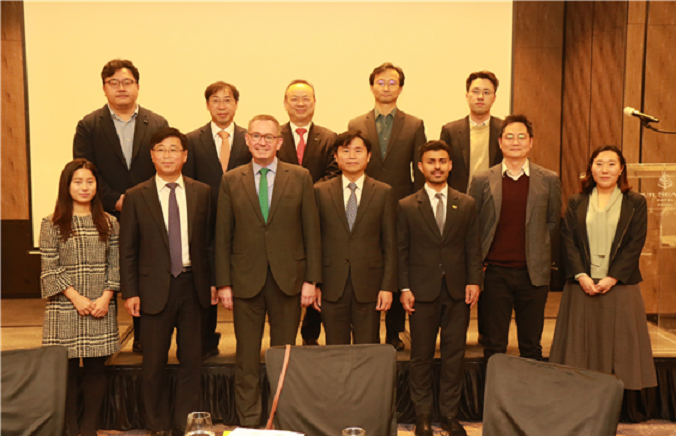
Group photo of attendees
Dr. Seong-won Park, a Research Fellow at the National Assembly Futures Institute, offered insights on more specific measures, particularly regarding the role of the National Assembly. He suggested that the National Assembly establish a “Future Generations Committee” as a Presidential Commission or under the Office of the Prime Minister, and a “Future Generations Court” in the judiciary. He emphasized the importance of overcoming the short-term-oriented, superficial response of the current generation through legislation that protects the rights and interests of future generations.
- PrevKEI Participated in the UN 2023 Water Conference
- NextKEI Celebrates its 30th Anniversary―30 Years of KEI, Reflections and Visions for the Future
